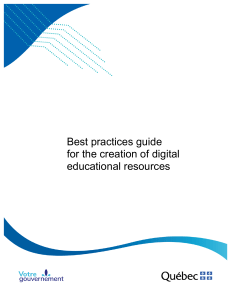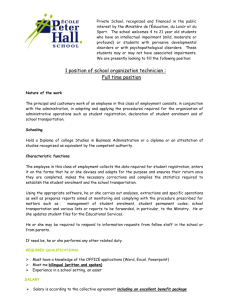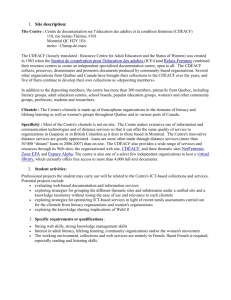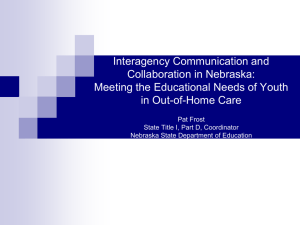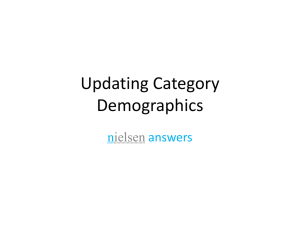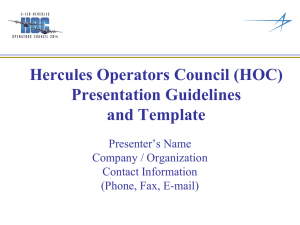J.D. Flanagan Chairman
advertisement
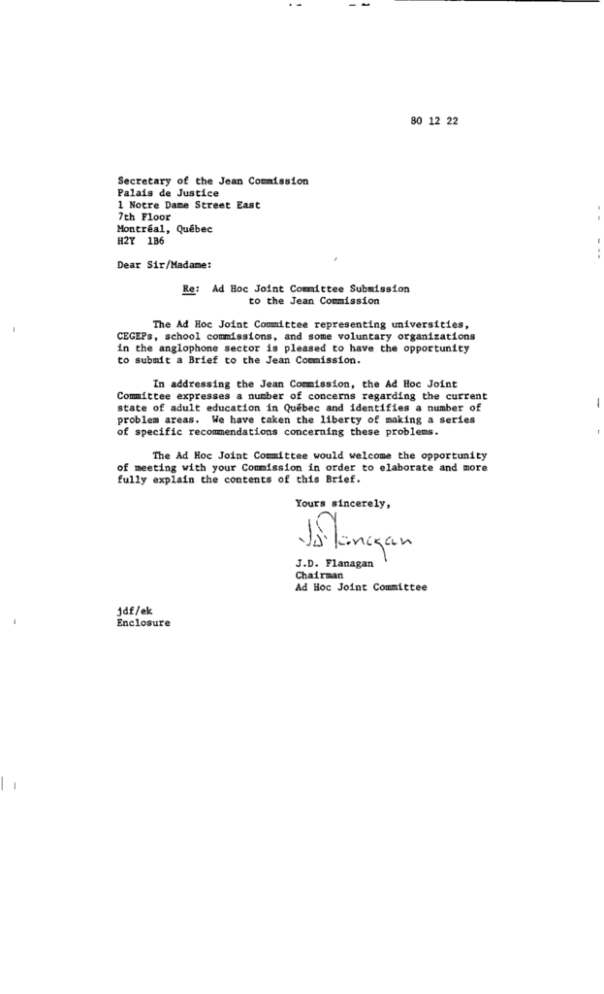
80 12 22 Secretary of the Jean Commission Palais de Justice 1 Notre Dame Street East 7th Floor Montréal, Québec H2Y 1B6 Dear Sir/Madame: Re: Ad Hoc Joint Committee Submission to the Jean Commission The Ad Hoc Joint Committee representing universities, CEGEPs, school commissions, and some voluntary organizations in the anglophone sector is pleased to hâve the opportunity to submit a Brief to the Jean Commission. In addressing the Jean Commission, the Ad Hoc Joint Committee expresses a number of concerns regarding the current state of adult éducation in Québec and identifies a number of problem areas. We hâve taken the liberty of making a séries of spécifie recommendations concerning thèse problems. The Ad Hoc Joint Committee would welcome the opportunity of meeting with your Commission in order to elaborate and more fully explain the contents of this Brief. Yours sincerely, v. à \ •V\l<^t\A J.D. Flanagan Chairman Ad Hoc Joint Committee jdf/ek Enclosure Table of Contents page Members of the Executive Committee 1 Members of the Ad Hoc Joint Committee J. Mandate 2 Objectives 3 Recommendations 5 BRIEF To: From: LA COMMISSION D'ETUDE SUR LA FORMATION DES ADULTES (hereinafter referred to as "THE JEAN COMMISSION") THE AD HOC JOINT COMMITTEE ON ADULT EDUCATION (hereinafter referred to as the "AD HOC JOINT COMMITTEE") 80 12 22 MEMBERS OF THE EXECUTIVE COMMITTEE: Mrs. P. Blaukopf Associate Dean, Centre for Continuing Education John Abbott Collège Dr. E. Burnett Associate Director, Management Certificate Department McGill University Mr. M. Pasteris Professional in Adult Education Montréal Catholic School Commission Mrs. D. Smith Coordinator, Continuing Education Division Champlain Régional Collège Mr. J.D. Flanagan, Chairman Director, Adult Education Protestant School Board of Greater Montréal 1. The Ad Hoc Joint Committee consists of représentatives from institutions offering adult services in the anglophone sector in the Province of Québec. Members of the Ad Hoc Joint Committee represent the following: Champlain Régional Collège Concordia University Dawson Collège cont. - 2 ­ 1. cont. Eastern Townships Régional School Board John Abbott Collège Montréal Catholic School Commission McGill University The Protestant School Board of Greater Montréal Vanier Collège YMCA Also included are représentatives frora the Institut Canadien de l'Education des Adultes, and the Canadian Association for Adult Education. The Ad Hoc Joint Committee came into being as a resuit of suggestions from the Canadian Association for Adult Education, supported by the Institut Canadien de l'Education des Adultes. Its first task was to organize a conférence on "The Adult Learner and the Future of Adult Education in Québec" - a conférence which was held on May 14 and 15, 1980, at La Sapinière, Québec, with the purpose of studying the needs of adult learners in the anglophone sector. At this conférence certain recommendations, which follow, were made for submission to the Jean Commission. Furthermore, at this conférence the Ad Hoc Joint Committee was mandated to proceed with the création of "an ongoing group or association, through which the processes started hère can continue." cont. - 3 ­ 1. cont. To extend the consultative process, the Ad Hoc Joint Committee organized and conducted a public meeting in Montréal on October 27, 1980, to which interested parties were invited to send delegates, or to attend as individuals, in order to make recommendations to the Jean Commission, as well as to take action on setting up a continuing organization of those who serve adult éducation in the anglophone sector. The recommendations made later in this brief are, accordingly, the resuit of délibérations at the La Sapinière Conférence and at the public meeting. The spécifie objectives of the Ad Hoc Joint Committee, in addition to making recommendations to the Jean Commission, are to: a. provide leadership in meeting the needs of adult learners in the anglophone sector in Québec; b. facilitate access to learning opportunities for adults in Québec; c. 2. promote and animate the development of continuing éducation. The Ad Hoc Joint Committee is concerned with both vocational and socio-cultural training. Its orientation to both of thèse concerns is revealed in the recommendations that follow. cont - 4 ­ 3. The clients of the institutions représentée! by the Ad Hoc Joint Committee consist of groups and individuals who look to school commissions, CEGEPs, universities, or community organizations for adult éducation in ail of its faoets. 4. As a group, the members of the Ad Hoc Joint Committee agreed, in principle, on the following: The many différent agents offering adult services must work closely together so that resources may be used to best advantage. Thèse services should be offered not only by existing educational institutions, but also by the voluntary sector which must play an important rôle. Community organizations and groups must be encouraged to be active in this field. In addition to serving the needs of individuals, adult éducation must also serve community needs, and one of its major purposes must be to assist individuals and groups to effect changes in the community and in society. More attention must be paid to the needs of disadvantaged peoples and groups. There must be no paternalism on the part of the dispensers of adult éducation. The consumer must be involved in planning, programming, and evaluating at ail levels of the future development of adult éducation. cont - 5 ­ RECOMMENDATIONS The Ad Hoc Joint Committee accordingly makes the following recommandations to the Jean Commission based on consultation and délibération at the La Sapinière Conférence and at the October Public Meeting: 1. That adults be participants in policy-making and programming in their own continuing éducation, and that individual groups receiving adult services be able to assess their own needs. 2. That there be sought the collaboration of public institutions in the provision of technical help, specialized skills, and support services to learning groups at the local and community level. 3. To meet the needs of the non-francophone learner, that there be established a service to dispense information on the programmes of ail adult éducation courses and services being offered in the Greater Montréal area and elsewhere in the province. This service should also provide educational brokerage, including counselling, advising, information, and advocacy, and act as a referai agent for thèse adults. 4. With any proposed reorganization recommended by the Jean Commission, it is recommended that there be created a permanent consultative cont. - 6 ­ 4. cont. committee representing consumers of adult éducation services. 5. That structural and resource changes be made by the MEQ to give priority to disadvantaged groups with respect to access to adult éducation, i.e., such groups as illiterates, seniors, the linguistically disadvantaged, the poor, native peoples, and women. 6. That spécial attention be paid to the needs of women in thèse areas: a. counselling and support services; b. reorientation to changes in life situation; c. support for women's groups in the development of programmes for women; d. 7. vocational training programmes. That more women be included at the administrative level in educational institutions, and that sexism be eliminated within the agencies of éducation and training. 8. That support services be established to enable women who hâve the responsibility of caring for children to take advantage of adult éducation courses, and that flexible schedules and part-time study be provided to make it possible for working women to attend courses. cont. - 7 ­ 9. That illiteracy be regarded as a problem that can be solved, and that récognition be given to the inter-relationships of manpower, social services, and éducation in helping illiterates. 10. That there be expanding research on the adult as a learner, and on the adult learning environment; and that there be provision for adéquate andragogical training of educators in the field of continuing and coiranunity éducation. 11. That there be an ongoing review of the mandates and performances of agencies providing adult services, with a view to maximizing collaboration and maintaining relevant services. 12. That there be an allocation of resources to community-based groups, and to voluntary organizations; and that there be established a major rôle for the voluntary sector. 13. That priority be given to adult éducation as a source of social and community change. 14. That priority be given to popular éducation and to such programmes as those funded by OVEP. cont. - 8 ­ 15. That continuing éducation be treated as holistic éducation, as much involved with children as with adults. 16. That there be equal opportunity for ail to hâve access to second language éducation. 17. That there be open communications between institutions offering French language instruction for adults, and l'Office de la Langue Française, so that tests given by the latter are consistent with the content of the programme, and vice-versa. 18. That in areas where the anglophone population is thinly scattered the planning and exécution of continuing éducation programmes and services receive spécial attention. 19. That spécial attention be given to the needs of adult learners with respect to vocational éducation and job training and that ail institutions involved in Manpower training, government agencies and représentatives from industry establish procédures for reevaluating existing structures and recommend meaningful change in this area. 20. That paid educational leave be part of the policy of continuing éducation, cont, - 9 ­ 21. That the MEQ assume responsibility to assure that ail législation regarding adult éducation be translated into English and that information on such législation be disseminated to ail groups concerned.
